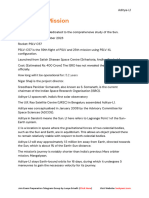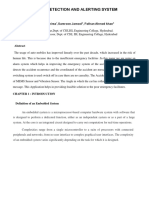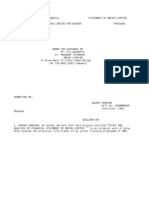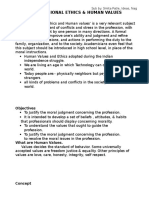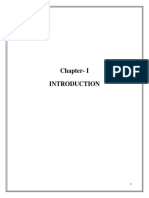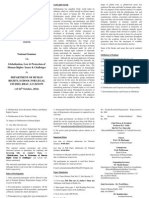Market Economy: Private Property
Market Economy: Private Property
Uploaded by
The Grizzled VetCopyright:
Available Formats
Market Economy: Private Property
Market Economy: Private Property
Uploaded by
The Grizzled VetOriginal Description:
Original Title
Copyright
Available Formats
Share this document
Did you find this document useful?
Is this content inappropriate?
Copyright:
Available Formats
Market Economy: Private Property
Market Economy: Private Property
Uploaded by
The Grizzled VetCopyright:
Available Formats
Market economy
market economy is a type of economic system where supply and demand regulate the economy,
rather than government intervention. A true free market economy is an economy in which all
resources are owned by individuals. The decisions about the allocation of those resources are
made by individuals without government intervention. There are no completely "free-enterprise"
or market economies.
One of the most important characteristics of a market economy, also called a free enterprise
economy, is the role of a limited government. Most economic decisions are made by buyers and
sellers, not the government. A competitive market economy promotes the efficient use of its
resources. It is a self-regulating and self-adjusting economy. No significant economic role for
government is necessary.
PRIVATE PROPERTY
Labor resources, natural resources, capital resources (e.g., equipment and buildings), and the
goods and services produced in the economy are largely owned by private individuals and
private institutions rather than by government. This private ownership combined with the
freedom to negotiate legally binding contracts permits people, within very broad limits, to obtain
and use resources as they choose.
FREEDOM OF ENTERPRISE AND CHOICE
Private entrepreneurs are free to obtain and organize resources in the production of goods and
services and to sell them in markets of their choices. Consumers are at liberty to buy that
collection of goods and services that best satisfies their economic wants. Workers are free to seek
any jobs for which they are qualified.
MOTIVE OF SELF-INTEREST
The "Invisible Hand" that is the driving force in a market economy is each individual promoting
his or her self-interest. Consumers aim to get the greatest satisfaction from their budgets;
entrepreneurs try to achieve the highest profits for their firms; workers want the highest possible
wages and salaries; and owners of property resources attempt to get the highest possible prices
from the rent and sale of their resources.
COMPETITION
Economic rivalry means that buyers and sellers are free to enter or leave any market and that
there are buyers and sellers acting independently in the marketplace. It is competition, not
government regulation, that diffuses economic power and limits the potential abuse of that power
by one economic unit against another as each attempts to further its own self-interest.
SYSTEM OF MARKETS AND PRICES
Markets are the basic coordinating mechanisms in our type of economy, not central planning by
government. A market brings buyers and sellers of a particular good or service into contact with
one another. The preferences of sellers and buyers are registered on the supply and demand sides
of various markets, and the outcome of these choices is a system of product and resource prices.
These prices are guideposts on which participants in markets make and revise their free choices
in furthering their self-interests.
LIMITED GOVERNMENT
A competitive market economy promotes the efficient use of its resources. As a self-regulating
and self-adjusting economy, no significant economic role for government is necessary. However,
a number of limitations and undesirable outcomes associated with the market system result in an
active, but limited economic role for government.
Merits
Competition between different firms leads to increased efficiency, as firms do whatever
is necessary—including laying off workers—to lower their costs;
Most people work harder (the threat of losing one's job is a great motivator);
There is more innovation as firms look for new products to sell and cheaper ways to do
their work;
Foreign investment is attracted as word gets out about the new opportunities for earning
profit;
The size, power, and cost of the state bureaucracy is correspondingly reduced as various
activities that are usually associated with the public sector are taken over by private
enterprises;
Demerits
Disparity in wealth and mobility exists in market economies because wealth tends to generate
wealth. In other words, it's easier for wealthy individuals to become wealthier than it is for the
poor to become wealthy.
Environmental damage results with no government regulations because it's usually more
expensive to produce in an environmentally sound manner, which reduces profits.
There tends to be a reduced social safety net, including such programs as unemployment
insurance, Social Security, and Medicare, because these programs are supported through
taxation.
Poor working conditions can result due to a lack of government regulations because health and
safety cost money, thus reducing profits.
Questionable priorities can result when the overriding decisions regarding production are profit-
motivated rather than serving the needs of the people in society.
You might also like
- Banking and The Money Supply: Macro Topic 4.4Document2 pagesBanking and The Money Supply: Macro Topic 4.4Preksha Borar100% (2)
- BUS4010 Contemporary Business Environment (2711)Document8 pagesBUS4010 Contemporary Business Environment (2711)NikhilNo ratings yet
- Micro Teaching Is A Best Example For SimulationDocument2 pagesMicro Teaching Is A Best Example For SimulationdelnaNo ratings yet
- Theories of Economic Development PDFDocument9 pagesTheories of Economic Development PDFPushpendra63% (8)
- Adolescent Development - Assignment 2Document3 pagesAdolescent Development - Assignment 2api-3576446830% (1)
- Impact of Advertisement On SocietyDocument8 pagesImpact of Advertisement On SocietyMilind AudichyaNo ratings yet
- Study of Application and Adverse Effects of Pesticides On Human HealthDocument30 pagesStudy of Application and Adverse Effects of Pesticides On Human Healthbiditharyal6No ratings yet
- Project Report: Bharti AirtelDocument45 pagesProject Report: Bharti AirtelSahil SethNo ratings yet
- Family Law AssignmentDocument2 pagesFamily Law Assignmentisha04tyagiNo ratings yet
- DemonetizationDocument27 pagesDemonetizationSuman PoudelNo ratings yet
- Road Divider ReportLDocument88 pagesRoad Divider ReportLKrina Parekh100% (1)
- Overpopulation in IndiaDocument4 pagesOverpopulation in IndiaKumar Vaishnav50% (2)
- Cbse Class 10 Science Notes Chapter 16 Sustainable Management of Natural ResourceDocument5 pagesCbse Class 10 Science Notes Chapter 16 Sustainable Management of Natural ResourceRajnesh vanavarajanNo ratings yet
- Project Synopsis: ERP ImplementationDocument6 pagesProject Synopsis: ERP ImplementationAchal Kumar0% (1)
- RF Based Home-AutomationDocument58 pagesRF Based Home-AutomationRahul SainiNo ratings yet
- Assisting With Dilatation and Curettage ProcedureDocument18 pagesAssisting With Dilatation and Curettage ProcedureRoselineTiggaNo ratings yet
- Current Trends of International Trade in IndiaDocument10 pagesCurrent Trends of International Trade in IndiaponnulakshmiNo ratings yet
- PJDocument51 pagesPJRasel AlamNo ratings yet
- Wireless Battery Charging PresentationDocument20 pagesWireless Battery Charging PresentationKhala JaanNo ratings yet
- Federal System of GovernmentDocument8 pagesFederal System of GovernmentaleneNo ratings yet
- Mental Health Services in IndiaDocument10 pagesMental Health Services in IndiaMr cholaNo ratings yet
- Presentation On Money & BankingDocument15 pagesPresentation On Money & BankingRahul VyasNo ratings yet
- Aditya-L1 MissionDocument8 pagesAditya-L1 MissionVeeraVenkataSaiDurgaPrasad GubbalaNo ratings yet
- The Comprehensive Analysis of Educational Philosophy of Swami Vivekananda and Its Relevance in Modern India With Special Reference To His Man Making Concept of Education.Document5 pagesThe Comprehensive Analysis of Educational Philosophy of Swami Vivekananda and Its Relevance in Modern India With Special Reference To His Man Making Concept of Education.Ss SsNo ratings yet
- Manufacturing IndustryDocument12 pagesManufacturing IndustryRuchi GuptaNo ratings yet
- RJ Synopsis Antenna RevisedDocument7 pagesRJ Synopsis Antenna RevisedragvshahNo ratings yet
- Accident-Detection-And-Alerting-System RUSHIDocument49 pagesAccident-Detection-And-Alerting-System RUSHIRushikesh MuleNo ratings yet
- Corporate GovernanceDocument46 pagesCorporate GovernancevirajNo ratings yet
- Airtel PPT Report On StrategyDocument31 pagesAirtel PPT Report On StrategySteven PriceNo ratings yet
- Project On International BusinessDocument13 pagesProject On International BusinessShreya JainNo ratings yet
- Study and Analysis of Financial A ReportDocument26 pagesStudy and Analysis of Financial A Reportpriyanka81287No ratings yet
- Entrepreneurship - Problems and Challenges Faced PDFDocument5 pagesEntrepreneurship - Problems and Challenges Faced PDFLinda BrownNo ratings yet
- IGNOU MSCCFT Block-1Document180 pagesIGNOU MSCCFT Block-1Dr. Megha RichhariyaNo ratings yet
- Patanjali Project ReportDocument46 pagesPatanjali Project ReportashutoshNo ratings yet
- Untitled 0Document86 pagesUntitled 0accord123No ratings yet
- Crime Against Women in IndiaDocument5 pagesCrime Against Women in IndiabhartiNo ratings yet
- External Environment External Environment: An External Environment Is Composed of All The Outside Factors orDocument3 pagesExternal Environment External Environment: An External Environment Is Composed of All The Outside Factors orHimanshu DarganNo ratings yet
- Project Seminar Hospice FedoraDocument3 pagesProject Seminar Hospice FedoralalithaNo ratings yet
- Globalisation and Its Impact On Indian EconomyDocument35 pagesGlobalisation and Its Impact On Indian Economyvansh rajputNo ratings yet
- PROFESSIONAL ETHICS & Human Values Smita PatleDocument6 pagesPROFESSIONAL ETHICS & Human Values Smita Patlesmita gaydhaniNo ratings yet
- A Study On Digital Marketing and Its Impact On Consumers PurchaseDocument15 pagesA Study On Digital Marketing and Its Impact On Consumers PurchaseAbdul Nafi SarwariNo ratings yet
- Seem ADocument84 pagesSeem ANishant AwasthiNo ratings yet
- National Seminar Human Right PDFDocument3 pagesNational Seminar Human Right PDFLive LawNo ratings yet
- The Power Triangle in The Indian Ocean China India and The United StatesDocument20 pagesThe Power Triangle in The Indian Ocean China India and The United StatesSiddharth SinghNo ratings yet
- Article On Media Law and PolicyDocument29 pagesArticle On Media Law and PolicyKeshav MaheshwariNo ratings yet
- IPD Food Donation ProjectDocument49 pagesIPD Food Donation Projectkartik malikNo ratings yet
- Monetary and Fiscal Policies in IndiaDocument5 pagesMonetary and Fiscal Policies in Indiarakeshgopinath4999No ratings yet
- Theoritical PerspectiveDocument64 pagesTheoritical Perspectivenurgu100% (3)
- Assessment& ChallengesDocument9 pagesAssessment& ChallengesrtkobNo ratings yet
- Types of Employee RewardsDocument7 pagesTypes of Employee RewardskiranaomomNo ratings yet
- Role and Importance of COPRA, 1986Document11 pagesRole and Importance of COPRA, 1986Mugdha Tomar100% (1)
- Factors Influencing EntrepreneurshipDocument3 pagesFactors Influencing EntrepreneurshipHoye OyeNo ratings yet
- An Evaluative Study On The Role of Self-Help Groups in Empowering Women in IndiaDocument18 pagesAn Evaluative Study On The Role of Self-Help Groups in Empowering Women in IndiaDipannita Roy100% (1)
- A Study On Jagadguru Adi Shankaracharya With Specific Reference To The Principles and Practices of Management (Sankara As A Manager)Document6 pagesA Study On Jagadguru Adi Shankaracharya With Specific Reference To The Principles and Practices of Management (Sankara As A Manager)Vishnu HNo ratings yet
- A Project Report Submitted To J.N.T.U, KAKINADA in Partial Fulfillment of The Requirements For Award of The Degree ofDocument113 pagesA Project Report Submitted To J.N.T.U, KAKINADA in Partial Fulfillment of The Requirements For Award of The Degree ofJoanne GeorgeNo ratings yet
- International Trade PDFDocument4 pagesInternational Trade PDFanto juaNo ratings yet
- Agriculture in India Issues and ChallengesDocument9 pagesAgriculture in India Issues and ChallengesAkhil SatheeshNo ratings yet
- What Is A Market Economy?Document3 pagesWhat Is A Market Economy?Marisse AlvaricoNo ratings yet
- Free Market EconomyDocument6 pagesFree Market Economyabjafra3No ratings yet
- Market EconomyDocument7 pagesMarket EconomythehumughumuNo ratings yet
- What Is The Market EconomyDocument17 pagesWhat Is The Market EconomysharifNo ratings yet
- Section 1 D, E, F, GDocument26 pagesSection 1 D, E, F, Gtaona madanhireNo ratings yet
- UntitledDocument7 pagesUntitledFakayode AdedamolaNo ratings yet
- CT (BPS-15) Haripur MaleDocument35 pagesCT (BPS-15) Haripur MaleThe Grizzled VetNo ratings yet
- DelleChiaie TesitriennaleDocument75 pagesDelleChiaie TesitriennaleThe Grizzled VetNo ratings yet
- Believing in Books - Twenty-First Century Fantasy and The Re-EnchaDocument278 pagesBelieving in Books - Twenty-First Century Fantasy and The Re-EnchaThe Grizzled VetNo ratings yet
- Political Imbroglios in Kamila Shamsie's Home Fire and Mohammad Hanif's A Case of Exploding MangoesDocument14 pagesPolitical Imbroglios in Kamila Shamsie's Home Fire and Mohammad Hanif's A Case of Exploding MangoesThe Grizzled VetNo ratings yet
- Murder in The CathederalDocument20 pagesMurder in The CathederalThe Grizzled VetNo ratings yet
- Theories of Language AcquisitionDocument3 pagesTheories of Language AcquisitionThe Grizzled VetNo ratings yet
- Main Characters From The Caretaker': Writer: Harold PinterDocument6 pagesMain Characters From The Caretaker': Writer: Harold PinterThe Grizzled VetNo ratings yet
- Mixed Economic System: Characteristics of Mixed EconomyDocument3 pagesMixed Economic System: Characteristics of Mixed EconomyThe Grizzled VetNo ratings yet
- Name: Malik Anwaar Ahmed Class: BS English-6 Roll No: 5743 Subject: Literary Theory Department of EnglishDocument7 pagesName: Malik Anwaar Ahmed Class: BS English-6 Roll No: 5743 Subject: Literary Theory Department of EnglishThe Grizzled VetNo ratings yet
- Economic GrowthDocument56 pagesEconomic GrowthJayani UmeshaNo ratings yet
- Lazaretou Sophia - Greece From 1833 To 1949 (Bank of Greece)Document70 pagesLazaretou Sophia - Greece From 1833 To 1949 (Bank of Greece)NagelNo ratings yet
- Assignment 3Document5 pagesAssignment 3Nabeel BhuttaNo ratings yet
- tài chính quốc tếDocument6 pagestài chính quốc tếvy phạmNo ratings yet
- Activity 8 Financial Market Is LM GarcesleeyasonDocument14 pagesActivity 8 Financial Market Is LM GarcesleeyasonCheska Lee100% (1)
- Tutorial5 Answers 3Document8 pagesTutorial5 Answers 3Konstantinos DelaportasNo ratings yet
- Grade XII TERM 1 Holiday Homework Economics IEDDocument29 pagesGrade XII TERM 1 Holiday Homework Economics IEDMELLY RokithNo ratings yet
- Thomas J. SargentDocument7 pagesThomas J. Sargentthomas555No ratings yet
- Ashok Leyland LTD: ESG Disclosure ScoreDocument8 pagesAshok Leyland LTD: ESG Disclosure ScoreRomelu MartialNo ratings yet
- The Contemporary World (Reviewer) : Important Terms - Guide DefinitionDocument4 pagesThe Contemporary World (Reviewer) : Important Terms - Guide DefinitionJoseph M. MarasiganNo ratings yet
- Code:-810 Course: Economic Planning: Techniques and Applications Level: MSC Semester: Autumn, 2019 Assignment No. 1Document3 pagesCode:-810 Course: Economic Planning: Techniques and Applications Level: MSC Semester: Autumn, 2019 Assignment No. 1Hammad AwanNo ratings yet
- The Gold Cartel Government Intervention in Gold The Mega-Bubble in Paper and What This Means For Your Future PDFDrive 1 PDFDocument322 pagesThe Gold Cartel Government Intervention in Gold The Mega-Bubble in Paper and What This Means For Your Future PDFDrive 1 PDFHecarim KassadinNo ratings yet
- 12th Economics Full Study Material English Medium 2022-23Document90 pages12th Economics Full Study Material English Medium 2022-23Lokesh80% (5)
- ? Understanding Fiscal Policy VsDocument3 pages? Understanding Fiscal Policy Vssaicharan.lansNo ratings yet
- Chapter 1: Nature and Scope of Economics: Unit 1: IntroductionDocument2 pagesChapter 1: Nature and Scope of Economics: Unit 1: Introductionvasantha mulpuriNo ratings yet
- Mini Case BitcoinDocument2 pagesMini Case BitcoinazNo ratings yet
- LPG 140919015537 Phpapp01Document15 pagesLPG 140919015537 Phpapp01SkRossiNo ratings yet
- Project Report On Demonetization Final DissertationDocument48 pagesProject Report On Demonetization Final Dissertationkashinath harkud100% (1)
- The Effects of Fiscal Policy On Private Business InvestmentDocument2 pagesThe Effects of Fiscal Policy On Private Business InvestmentT uohzNo ratings yet
- Infostream Q1 23Document26 pagesInfostream Q1 23Ally Bin AssadNo ratings yet
- Boughton James. Porqué White y No Keynes. 25 Páginas InglésDocument25 pagesBoughton James. Porqué White y No Keynes. 25 Páginas InglésKaro GutierrezNo ratings yet
- ME Cheat Sheet For FinalDocument4 pagesME Cheat Sheet For Finalkaungwaiphyo89No ratings yet
- No Textbook - Main Focus On Cases and Reports.: Now (BGRS)Document44 pagesNo Textbook - Main Focus On Cases and Reports.: Now (BGRS)V SURENDAR NAIKNo ratings yet
- How To Consistently Make $900 - $9,000 in 48 Hours or Less: Forex & Gold Trading Bootcamp Break-Out SessionDocument10 pagesHow To Consistently Make $900 - $9,000 in 48 Hours or Less: Forex & Gold Trading Bootcamp Break-Out SessionIsmail LaNo ratings yet
- Case (Renminbi) - Discussion QuestionsDocument2 pagesCase (Renminbi) - Discussion QuestionsAnimesh ChoubeyNo ratings yet
- Profit TheoriesDocument9 pagesProfit TheoriesRishwanth SNo ratings yet
- Exchange Rate Systems and Arrangements in PracticeDocument34 pagesExchange Rate Systems and Arrangements in PracticeDhular HassanNo ratings yet






















